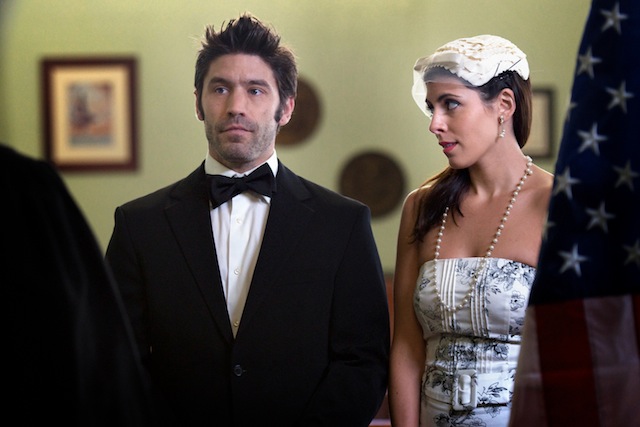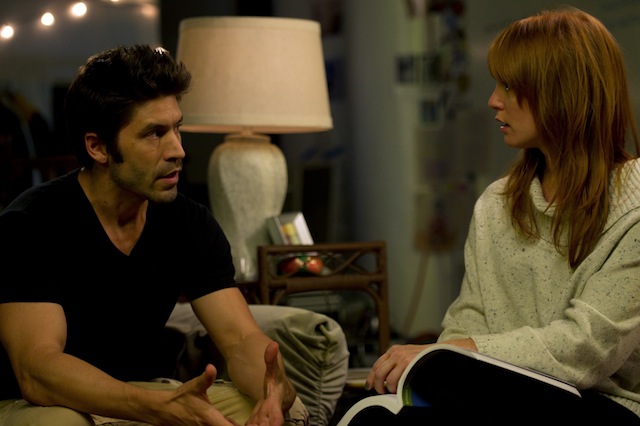CHICAGO – In anticipation of the scariest week of the year, HollywoodChicago.com launches its 2024 Movie Gifts series, which will suggest DVDs and collections for holiday giving.
‘I Do’ Tackles Weighty Issues with Tender Insight
 Rating: 3.0/5.0 |
CHICAGO – Nothing bugs a critic more than obstacles strategically placed in the path of otherwise happy characters. Without the conspiratorial manipulations of the plot, these people would have no problem leading perfectly content lives. Instead of emerging organically from the characters themselves, the conflict swoops in like a speeding car fresh off the highway.
That’s more or less what happens in the opening moments of Glenn Gaylord’s “I Do,” as a suave, good-natured Brit, Peter (Grant Bowler), is hit by a car upon leaving a New York restaurant with his pregnant wife, Mya (Alicia Witt), and brother, Jack (David W. Ross). Since Jack’s primary character flaw is that he’s too nice, he spends the next seven years raising his adorable niece, Tara (Jessica Tyler Brown), with Mya, while putting his personal life entirely on hold. Jack may have come off as a maddeningly idealized saint if he hadn’t been played with such self-effacing sensitivity by Ross, who also wrote the screenplay.
As misfortune continued to befall the long-suffering protagonist, my pulse began to quicken until I sensed the film’s underlying agenda. This isn’t a story so much as it is an archetypal illustration of the injustices waged by the Defense of Marriage Act, which bars same sex couples from the federal benefits granted to heterosexuals. Though this law doesn’t play a crucial role until the film’s third act, the entire story depends on its annihilation of human rights. If the law didn’t exist, there wouldn’t be much of a story here to tell, but since it actually does exist in real life, it’s easier to accept. As a timely portrait of the difficulty in living a functional life as a homosexual in America, Gaylord’s film is quite touching. It’s a very straightforward piece of work, but there is a certain power in its simplicity. Only bigots with a heart of stone would be able to resist rooting for a character like Jack, a gay man who has specialized in putting everyone else’s needs ahead of his own.

David W. Ross and Jamie-Lynn Sigler star in Glenn Gaylord’s I Do.
Photo credit: School Pictures
In a rather amusing twist on the “I Now Pronounce You Chuck and Larry” formula, Jack is forced to marry his lesbian best friend, Ali (Jamie-Lynn Sigler of “The Sopranos” fame), after his work visa expires. There’s a deliciously awkward silence following their recitation of wedding vows punctuated by a chaste kiss which the priest observes for a prolonged beat. Ali’s delivery of the line, “Thanks,” gets one of the film’s biggest laughs, though it’s clear that the notion of marriage as a method to escape deportation is no laughing matter. Though Ali starts out as a vibrant presence in the film, her character is quickly sidelined by other members of the ensemble, particularly Mano (Maurice Compte), the Spanish architect who falls in tender mutual love with Jack. This wouldn’t be as much of a problem if Ali’s character hadn’t raised so many question marks. A brief scene of Ali spying on Jack in the shower suggests that she might be bisexual. What is she precisely getting out of her “marriage” to Jack and why is it so difficult for her to leave it? These are intriguing questions, but the script has too narrow a focus to deal with them adequately.
Another casualty of the script is Mya, marvelously played by the oft-underutilized Witt, who conveys an entire symphony of conflicted emotion and festering wounds in a mere handful of scenes. Yet her work is undermined by scenes that require her character to act warmly inviting one minute and coldly accusatory the next. There are some melodramatic flourishes that could’ve been toned down several octaves, while the comic relief delivered by veteran publicist-turned-actor Mickey Cottrell is so on-the-nose it practically comes equipped with a laugh track. The film also has a troubling tendency to spell out themes in musical montages not unlike those in major Hollywood blockbusters. Do we really need a scene where Jack ponders whether he’s living the life he wants to live while a song blares on the soundtrack, bearing the lyrics, “Is this really the life you want to live?” Nothing patronizes an audience more than a song spoon-feeding messages that they have long since digested.

David W. Ross and Alicia Witt star in Glenn Gaylord’s I Do.
Photo credit: School Pictures
These flaws ultimately amount to quibbles in “I Do,” which is a well-acted and insightful little gem, but they did keep me at arm’s length. With a more polished script and less manufactured sentiment, the film may have been able to resonate as something more than an earnest message movie. It certainly has its heart in the right place, and does have a shot at illuminating the minds of viewers undecided on the issue of gay rights. How can we believe that we live in an enlightened age when we need films like this one to remind us of our governmentally enforced ignorance?
 | By MATT FAGERHOLM |


